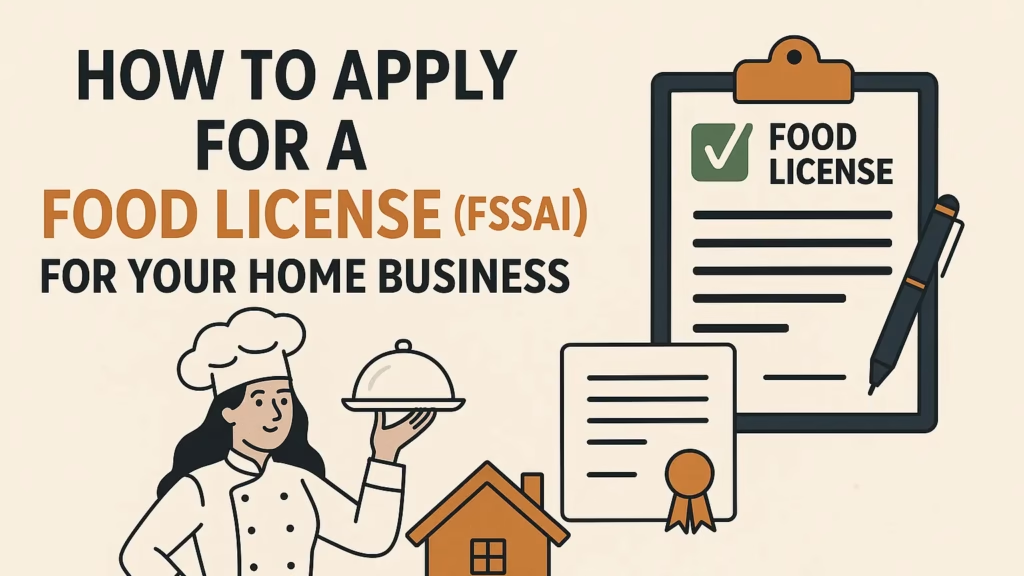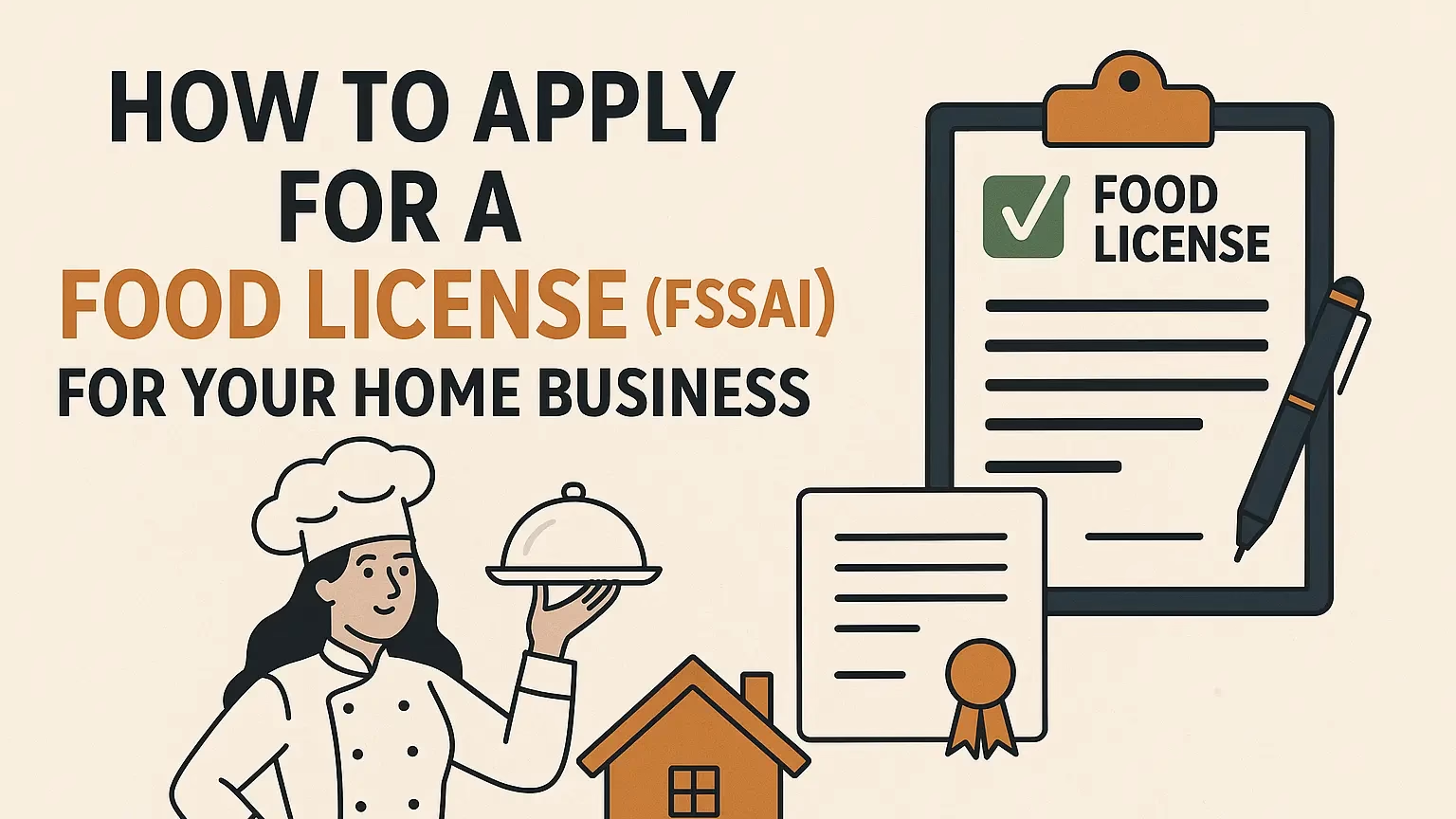Step-by-Step Guide of “How Apply for a Food License (FSSAI)”
Here we learn How to Apply for a Food License (FSSAI) for Your Home Business. Opening a home food business is a thrilling venture for food-loving cooks, bakers, and others. If you sell homemade pickles, cakes, or food, you have to adhere to food safety regulations in India. Most crucial requirement? A food license from the Food Safety and Standards Authority of India (FSSAI).
In this detailed guide, we’ll walk you through how to apply for a Food License (FSSAI) for your home-based food business, that is, for your home food business. We’ll also cover usual pitfalls, suggestions for hassle-free processing, advantages of compliance, and address some frequently asked questions.

What is FSSAI?
Before we go into How to Apply for a Food License (FSSAI) we need understand what is The Food Safety and Standards Authority of India (FSSAI). FSSAI is a government organization responsible for regulating and supervising food safety in India. It was established under the Food Safety and Standards Act, 2006. FSSAI is tasked with protecting and promoting public health through the regulation and supervision of food safety.
FSSAI prescribes science-based guidelines for foodstuffs and administers their manufacturing, storage, distribution, retailing, and import. FSSAI checks that foodstuffs are safe and suitable for human consumption. All food business operators (FBOs) – even domestic ones – must obtain an FSSAI license or registration depending on their activity scale.
Types of FSSAI Licenses
If you’re learning how to apply for a Food License (FSSAI), it’s essential to understand the three license types:
Simple FSSAI Registration
- For small companies with a turnover of not more than Rs. 12 lakhs per year.
- Suitable for home-based food units, street food vendors, small food vendors, and small food manufacturers.
State License
- For firms with turnover ranging from Rs. 12 lakhs to Rs. 20 crores.
- Applies to medium-scale businesses like restaurants, medium-scale manufacturers, transporters, warehousing units, and so forth.
Central License
- For large organizations with turnover over Rs. 20 crores.
- Required also if more than one state is being worked in or for import/export of food items.
For a newly starting home business, the Basic FSSAI Registration will generally do.
Why You Must Have an FSSAI License for Your Home Business
Even if you’re running your food business from your kitchen, learning how to apply for a Food License (FSSAI) is important because:
- Compulsory under Indian law.
- Trust-inspiring: It guarantees customers that your food is safe and clean.
- Professional: Indicates that you’re serious about your food business.
- Facilitates growth: Allows you to collaborate with food ordering platforms such as Swiggy, Zomato, and online stores such as Amazon and Flipkart.
- Legal protection: Protects your business from legal proceedings for non-compliance.
- Brand building: FSSAI license number can be used on packaging and advertisements to build credibility.
How to Apply for a Food License (FSSAI) for Your Home Business
Step 1: Decide the Type of License You Require
Approximate your annual turnover and check if you require a Basic Registration, State License, or Central License. Home-based food businesses typically begin with Basic FSSAI Registration.
Step 2: Get Necessary Documents
Here are the documents you’ll require for Basic FSSAI Registration:
- Applicant’s passport-size photo
- Proof of identity (Aadhaar Card, PAN Card, Voter ID, etc.)
- Proof of address (Electricity bill, rental agreement, etc.)
- Specification of food products you intend to manufacture or sell
- Valid email ID and mobile number
- Business address and name
- Declaration form (Form-A)
For a State License, you can require:
- Premises layout plan
- Report of water testing
- Food category list
- Possession proof of premises (NOC, rent agreement)
- Food safety management plan
- Authority letter
- Proof of turnover
Step 3: Register on the FoSCoS Portal
- Open the official FSSAI Food Safety Compliance System (FoSCoS) website.
- Click on “Sign Up” and register yourself using your mobile number and email ID.
- Login with the generated credentials.
Step 4: Submission of Application Form
- Login and click on “Apply for Registration/License”.
- Select your state and select license type.
- Enter your business and personal information, product categories, and upload documents as required.
- Recheck everything before submitting.
Step 5: Payment of Fees
- Basic Registration: Rs. 100/year
- State License: Rs. 2,000 to Rs. 5,000 according to food business type
- Central License: Rs. 7,500 per annum
You may make online payment by using net banking, credit/debit card, or UPI.
Step 6: Track Your Application
The application status may be tracked with the application reference number. They will send reminders to your registered email ID and mobile number.
Step 7: Inspection (If Required)
For Basic Registration, inspections are not generally necessary. But for State and Central Licenses, a food safety officer can inspect your premises.
Step 8: Obtain Your License
If your application is successful, you will receive a digitally signed FSSAI certificate by email. You can also download it from the FoSCoS portal.
Validity and Renewal
- FSSAI licenses can be granted for a duration of 1 to 5 years based on your choice during the application.
- It is better to choose more than one year validity to circumvent annual renewal.
- The renewal should be done not less than 30 days from the date of expiry.
- Delay in renewal can cause penalties or license suspension.
Penalty for Not Having an FSSAI License
Operating a food business without an FSSAI license is a crime under the Food Safety and Standards Act, 2006.
- Fine: Max Rs. 5 lakhs
- Punishment: Max 6 months imprisonment in extreme situations
- Seizure of food products
- Shutdown of business operation
Common Errors to Mitigate
- Filing incomplete or inaccurate documentation
- Selecting an inappropriate type of license
- Failure to renew the license within the stipulated timeframe
- Disregard for inspection procedures
- Not displaying FSSAI number on food packagings and labels
- Having more than one location without valid licenses
Tips to Make the Process Easier
- Store all documents in soft copy (PDF/JPEG format) for easy upload.
- Have all documents with matching personal and business information.
- Seek professional consultant or legal help if necessary.
- Store your FoSCoS login credentials securely.
- Keep an eye on your email and SMS updates.
Other advantages of FSSAI License
Besides compliance, an FSSAI license brings:
- New market opportunities: It’s easier to associate with online food ordering apps.
- Opportunities to export: Selling products abroad could become a new avenue.
- Brand perception: Customers might trust FSSAI-certified food over regular food.
- Investor trust: Licenses can ensure your business seems more genuine to scale or when seeking funding.
What to Do After You Obtain Your FSSAI License?
After you have your license:
- Place it in a visible location in your kitchen or packaging.
- Print the 14-digit license number on packages of food.
- Maintain records of ingredients, sources, and storage conditions.
- Ensure hygiene, sanitation, and adherence to food safety rules.
FAQs About How to Apply for a Food License (FSSAI) for Home Businesses
Q1. Do I require an FSSAI license to sell food from home on Instagram or WhatsApp?
Yes. Even if you’re selling food online or word of mouth, an FSSAI license is mandatory by law.
Q2. I sell food occasionally. What then?
If your business involves regular sales of food, even on occasion, it still comes under the scope of FSSAI regulations.
Q3. Can I get an FSSAI license without a shop or commercial kitchen?
Yes. Basic registration can be done from home kitchens. Just ensure that your premises have basic hygiene conditions.
Q4. How long does it take to get the FSSAI license?
It generally takes 7–30 days, depending on the kind of license and whether an inspection is required.
Q5. Is the FSSAI license transferable?
No. FSSAI licenses cannot be transferred. If you are selling your business, the buyer has to apply for a new license.
Q6. Is it possible to have a single FSSAI license for several categories of food?
Yes, provided all the food categories are intimated at the time of application. Renew the license if new products are incorporated subsequently.
Q7. Do I require separate licenses if I have operations in more than one state?
Yes. You will require a Central License if you are operating in more than a single state.
Q8. What facilities do FSSAI provide to small and home enterprises?
FSSAI conducts training programs under the Food Safety Training and Certification (FoSTaC) program to facilitate small enterprises to comprehend compliance.
Q9. How is Registration different from License under FSSAI?
Registration is for extremely small enterprises (turnover < Rs. 12 lakh/year), whereas licenses are for bigger units. The registration procedure is less complicated and faster.
Q10. Can I later upgrade my FSSAI registration?
Yes, you can transition from Basic Registration to State or Central License as your business expands.
Conclusion
Obtaining an FSSAI license may feel like a bureaucratic obstacle, but it’s really a simple and required step in having a legitimate and successful home food business. It not only ensures your customers are safe but also generates trust and helps your brand expand.
With proper documents, minimal preparation, and this guide at your side, you can finish the process hassle-free. So, if you’ve been experimenting with tasty delicacies and have considered selling them, take it further—get your FSSAI license today and start your food business with ease!
Contact us
If you want to Contact us please – Click Here










